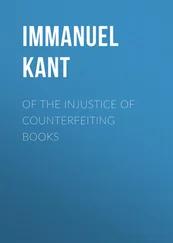36 We can easily conceive the non-existence of matter; but the ancients did not thence infer its contingency. But even the alternation of the existence and non-existence of a given state in a thing, in which all change consists, by no means proves the contingency of that state — the ground of proof being the reality of its opposite. For example, a body is in a state of rest after motion, but we cannot infer the contingency of the motion from the fact that the former is the opposite of the latter. For this opposite is merely a logical and not a real opposite to the other. If we wish to demonstrate the contingency of the motion, what we ought to prove is that, instead of the motion which took place in the preceding point of time, it was possible for the body to have been then in rest, not, that it is afterwards in rest; for in this case, both opposites are perfectly consistent with each other.
Chapter III. Of the Ground of the Division of all Objects into Phenomena and Noumena.
Table of Contents
We have now not only traversed the region of the pure understanding and carefully surveyed every part of it, but we have also measured it, and assigned to everything therein its proper place. But this land is an island, and enclosed by nature herself within unchangeable limits. It is the land of truth (an attractive word), surrounded by a wide and stormy ocean, the region of illusion, where many a fog-bank, many an iceberg, seems to the mariner, on his voyage of discovery, a new country, and, while constantly deluding him with vain hopes, engages him in dangerous adventures, from which he never can desist, and which yet he never can bring to a termination. But before venturing upon this sea, in order to explore it in its whole extent, and to arrive at a certainty whether anything is to be discovered there, it will not be without advantage if we cast our eyes upon the chart of the land that we are about to leave, and to ask ourselves, firstly, whether we cannot rest perfectly contented with what it contains, or whether we must not of necessity be contented with it, if we can find nowhere else a solid foundation to build upon; and, secondly, by what title we possess this land itself, and how we hold it secure against all hostile claims? Although, in the course of our analytic, we have already given sufficient answers to these questions, yet a summary recapitulation of these solutions may be useful in strengthening our conviction, by uniting in one point the momenta of the arguments.
We have seen that everything which the understanding draws from itself, without borrowing from experience, it nevertheless possesses only for the behoof and use of experience. The principles of the pure understanding, whether constitutive a priori (as the mathematical principles), or merely regulative (as the dynamical), contain nothing but the pure schema, as it were, of possible experience. For experience possesses its unity from the synthetical unity which the understanding, originally and from itself, imparts to the synthesis of the imagination in relation to apperception, and in a priori relation to and agreement with which phenomena, as data for a possible cognition, must stand. But although these rules of the understanding are not only a priori true, but the very source of all truth, that is, of the accordance of our cognition with objects, and on this ground, that they contain the basis of the possibility of experience, as the ensemble of all cognition, it seems to us not enough to propound what is true — we desire also to be told what we want to know. If, then, we learn nothing more by this critical examination than what we should have practised in the merely empirical use of the understanding, without any such subtle inquiry, the presumption is that the advantage we reap from it is not worth the labour bestowed upon it. It may certainly be answered that no rash curiosity is more prejudicial to the enlargement of our knowledge than that which must know beforehand the utility of this or that piece of information which we seek, before we have entered on the needful investigations, and before one could form the least conception of its utility, even though it were placed before our eyes. But there is one advantage in such transcendental inquiries which can be made comprehensible to the dullest and most reluctant learner — this, namely, that the understanding which is occupied merely with empirical exercise, and does not reflect on the sources of its own cognition, may exercise its functions very well and very successfully, but is quite unable to do one thing, and that of very great importance, to determine, namely, the bounds that limit its employment, and to know what lies within or without its own sphere. This purpose can be obtained only by such profound investigations as we have instituted. But if it cannot distinguish whether certain questions lie within its horizon or not, it can never be sure either as to its claims or possessions, but must lay its account with many humiliating corrections, when it transgresses, as it unavoidably will, the limits of its own territory, and loses itself in fanciful opinions and blinding illusions.
That the understanding, therefore, cannot make of its a priori principles, or even of its conceptions, other than an empirical use, is a proposition which leads to the most important results. A transcendental use is made of a conception in a fundamental proposition or principle, when it is referred to things in general and considered as things in themselves; an empirical use, when it is referred merely to phenomena, that is, to objects of a possible experience. That the latter use of a conception is the only admissible one is evident from the reasons following. For every conception are requisite, firstly, the logical form of a conception (of thought) general; and, secondly, the possibility of presenting to this an object to which it may apply. Failing this latter, it has no sense, and utterly void of content, although it may contain the logical function for constructing a conception from certain data. Now, object cannot be given to a conception otherwise than by intuition, and, even if a pure intuition antecedent to the object is a priori possible, this pure intuition can itself obtain objective validity only from empirical intuition, of which it is itself but the form. All conceptions, therefore, and with them all principles, however high the degree of their a priori possibility, relate to empirical intuitions, that is, to data towards a possible experience. Without this they possess no objective validity, but are mere play of imagination or of understanding with images or notions. Let us take, for example, the conceptions of mathematics, and first in its pure intuitions. “Space has three dimensions”—“Between two points there can be only one straight line,” etc. Although all these principles, and the representation of the object with which this science occupies itself, are generated in the mind entirely a priori , they would nevertheless have no significance if we were not always able to exhibit their significance in and by means of phenomena (empirical objects). Hence it is requisite that an abstract conception be made sensuous, that is, that an object corresponding to it in intuition be forthcoming, otherwise the conception remains, as we say, without sense, that is, without meaning. Mathematics fulfils this requirement by the construction of the figure, which is a phenomenon evident to the senses. The same science finds support and significance in number; this in its turn finds it in the fingers, or in counters, or in lines and points. The conception itself is always produced a priori , together with the synthetical principles or formulas from such conceptions; but the proper employment of them, and their application to objects, can exist nowhere but in experience, the possibility of which, as regards its form, they contain a priori .
Читать дальше












